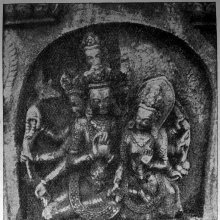Amritananda, Amṛtānanda, Amrita-ananda: 6 definitions
Introduction:
Amritananda means something in Hinduism, Sanskrit. If you want to know the exact meaning, history, etymology or English translation of this term then check out the descriptions on this page. Add your comment or reference to a book if you want to contribute to this summary article.
The Sanskrit term Amṛtānanda can be transliterated into English as Amrtananda or Amritananda, using the IAST transliteration scheme (?).
Images (photo gallery)
In Hinduism
Chandas (prosody, study of Sanskrit metres)
Source: Shodhganga: a concise history of Sanskrit Chanda literatureAmṛtānanda (अमृतानन्द) (19th century), son of Jayalakṣmī and Rāmānanda has composed a text named Chandomṛtalatā. He was a resident of Nepal and appointed as a Pundit by Brian Houghton Hodgson, the then British civil servant of British India, worked in India and Nepal. Amṛtānanda helped him to study the Buddhist and Sanskrit texts. Among his eight works written in Sanskrit, the Chandomṛtalatā is the only work on prosody.

Chandas (छन्दस्) refers to Sanskrit prosody and represents one of the six Vedangas (auxiliary disciplines belonging to the study of the Vedas). The science of prosody (chandas-shastra) focusses on the study of the poetic meters such as the commonly known twenty-six metres mentioned by Pingalas.
Shaktism (Shakta philosophy)
Source: Google Books: ManthanabhairavatantramAmṛtānanda (अमृतानन्द) refers to the “bliss of the nectar”, according to Jayaratha’s commentary on the Tantrāloka.—Accordingly, “The goddess who is the tranquil energy of the Moon who abides above as the aesthetic savour (rasa) of the bliss of the nectar of the full (Moon) (pūrṇ-amṛtānanda)”.

Shakta (शाक्त, śākta) or Shaktism (śāktism) represents a tradition of Hinduism where the Goddess (Devi) is revered and worshipped. Shakta literature includes a range of scriptures, including various Agamas and Tantras, although its roots may be traced back to the Vedas.
Languages of India and abroad
Sanskrit dictionary
Source: Cologne Digital Sanskrit Dictionaries: Aufrecht Catalogus CatalogorumAmṛtānanda (अमृतानन्द) as mentioned in Aufrecht’s Catalogus Catalogorum:—Alaṃkārasaṃgraha. Rice. 280.
Source: Cologne Digital Sanskrit Dictionaries: Monier-Williams Sanskrit-English DictionaryAmṛtānanda (अमृतानन्द):—[from a-mṛta > a-mūla] m. Name of a man, [Buddhist literature]
[Sanskrit to German]
Sanskrit, also spelled संस्कृतम् (saṃskṛtam), is an ancient language of India commonly seen as the grandmother of the Indo-European language family (even English!). Closely allied with Prakrit and Pali, Sanskrit is more exhaustive in both grammar and terms and has the most extensive collection of literature in the world, greatly surpassing its sister-languages Greek and Latin.
See also (Relevant definitions)
Partial matches: Amrita, Ananda.
Starts with: Amritanandana, Amritanandanatha, Amritanandatirtha, Amritanandavalli.
Full-text (+9): Alamkarasamgraha, Ramananda, Jayalakshmi, Amarananda yogindra, Dipakanatha, Tattvadipana, Yoginihridaya, Dharmakoshasamgraha, Lopamudra, Vyomasthana, Madhyamauli, Chandomritalata, Samkshiptavedantashastraprakriya, Adhyatmavidyopadeshavidhi, Balauli, Manavaugha, Vajravidarani, Ganapatihridaya, Grahamatrika, Dipaka.
Relevant text
Search found 5 books and stories containing Amritananda, Amṛtānanda, Amrita-ananda, Amrtananda, Amṛta-ananda, Amrta-ananda; (plurals include: Amritanandas, Amṛtānandas, anandas, Amrtanandas). You can also click to the full overview containing English textual excerpts. Below are direct links for the most relevant articles:
The Indian Buddhist Iconography (by Benoytosh Bhattachacharyya)
Figure 151 - Emanations of Vairocana: Nāmasaṅgīti (or Nāmasaṃgīti)
Figure 119 - (Avalokiteśvara): Sukhāvatī Lokeśvara
Buddhacarita (by Charles Willemen)
Vasudevavijaya of Vasudeva (Study) (by Sajitha. A)
Concept of Oneness in the Upanishads (study) (by Chandra Shekhar Upadhyaya)
Classification of the Upaniṣad < [Chapter 1 - Introduction]
Stupas in Orissa (Study) (by Meenakshi Chauley)



